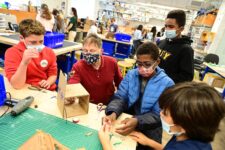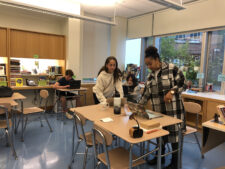The past many months have been unprecedented in what people around the world have had to endure — both collectively and as individuals. Between the dual pandemics of COVID-19 and systemic racism and a tumultuous presidential election, there have been myriad reasons to experience stress and feelings of uncertainty. It has never been more important to be attuned to one’s emotional health and well-being, as members of the Ethical Culture Fieldston School community take care of themselves and their families.
Middle school students are already living through one of the most important — and oftentimes challenging — developmental stages of their lives. They are transforming from young children into young adults, a change that can be as thrilling as it is frightening. “In the age range of ten or eleven years old to thirteen or fourteen years old, there is so much going on biologically, identity-wise, cognitively, and emotionally,” says Kylah Arias, Fieldston Middle Psychologist. “Students are figuring out who they are.”
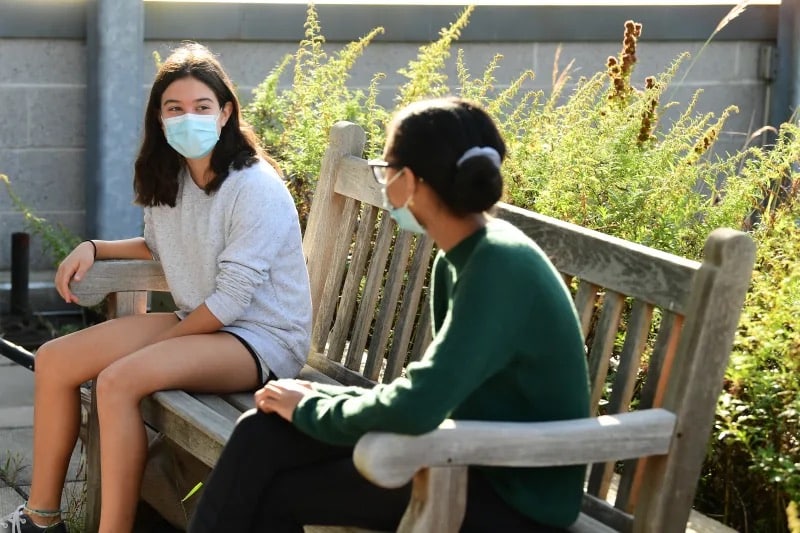
Faculty and staff at ECFS are acutely aware of the social and emotional needs of their students, even without the extenuating circumstances of the past year. During a time of increased tumult in the world at large, faculty and staff at Fieldston Middle have created space — both in person and remotely — for students to feel safe, comfortable, and able to thrive.
A historic year calls for specific care
“We were not trying to pretend that everything is okay — we were talking about it and calling it out,” says Bree Aitoro, Fieldston Middle Counselor. Her team prepared for the 2020–2021 academic year by first acknowledging the challenges that lie ahead, then making a plan for how to tackle them head on.
Before the start of classes, the Counseling team provided faculty members with specific signs or signals to look for in students (certain behaviors or changes in behaviors) in both in-person and remote settings — for example, instances in which students suddenly stopped using the camera feature during remote classes and were also seeing a significant decline in academic performance. Faculty knew to notify the Counseling team right away if they noticed any of these behaviors so that the students could receive the care and attention they needed.
The schedule created for the hyflex model — which involves students attending school both in person and remotely — was also designed to bolster the health and wellness of students. “The schedule was built keeping in mind that we’re all going through this trauma and it’s happening in real time,” says Arias. The schedule provided students with more time for lunch and study halls, giving them space to process and unwind, often away from screens.
The flexible schedule also provides the Counseling team with more access to students on a regular basis. In past years, the team could check in spontaneously with students who walked by their office. This year, those moments needed to be more intentional. Without that access, the team made it a priority to reach out to students sporadically to invite them to schedule optional meetings during their free time.
“It’s important to give them opportunities to talk about how they’re feeling. They’re not always able to do these things on their own yet, so having extra support in place to help them gain these skills is really helpful,” explains Arias.
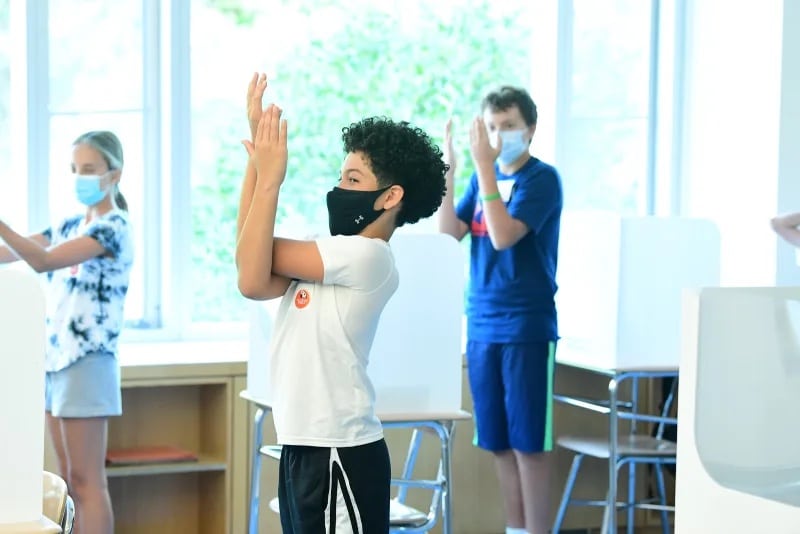
Finding community and joy
One of the biggest challenges of entering the hyflex model was maintaining a sense of community — and providing moments of joy — while students were both at home and on campus.
“Something that was on our radar this year is the lack of social time that kids have and how that’s affecting them,” says Aitoro. “We’re conscious of how difficult it is, especially for students who may be new to the School, to form connections, especially in the hyflex model. Students are not able to get to know each other the way they used to.”
In response, the Fieldston Middle Counseling team worked with the Grade Deans to hold a series of events throughout the year — remotely and in person — in which the only priorities were for students to have fun and relax.
Community Time, hosted by 6th Grade Dean Savi Tuber, gathered students every Friday for time together outside of the classroom for activities and discussions, often following themes such as “friendship.” The Counseling team also worked with 7th Grade Dean Elizabeth Flores to organize an “Old New and New New Lunch” for students — a special gathering for students who joined ECFS the previous year as 6th Graders and students who joined ECFS this year as 7th Graders. Around Halloween, students gathered online and played a game in which they guessed one another’s costumes, each student staying off camera and giving clues as to who or what they were dressed as before the grand reveal. At a time when making new friends is both especially challenging and incredibly important, events such as these provide an invaluable opportunity for students.
Another space where students could unwind and have fun together was clubs, which take place weekly during lunch. “Clubs give students the opportunity to socialize with students whom they might not know from other parts of their day, with whom they have a shared interest,” says Arias. “It’s a unique part of their day.” Clubs began to meet virtually in November, and over 75 students from across 6th, 7th, and 8th Grade signed up for one of nine options.
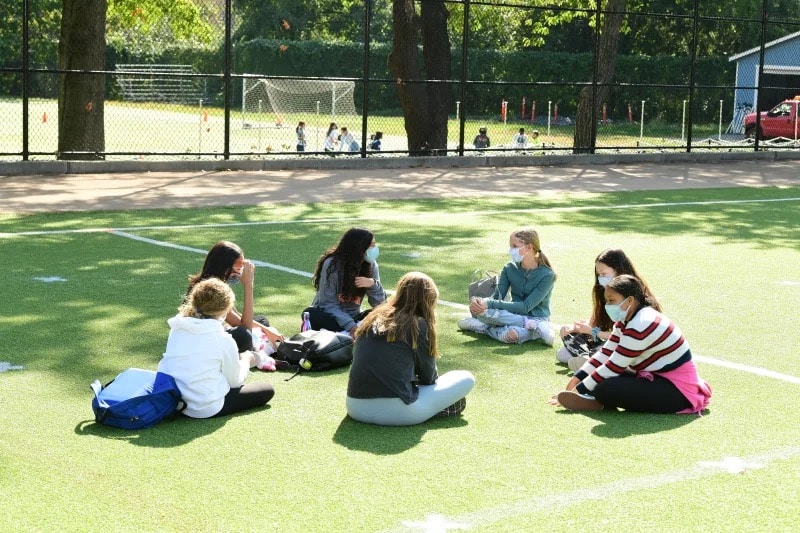
Support for parents, guardians, faculty, and staff
Students are, of course, not the only ones affected by the current circumstances. The adults in their lives are also struggling through these unprecedented times. “The support networks that would normally be there for our students are also vulnerable right now,” says Aitoro. “Not only are students experiencing their own anxiety and stress about what’s happening, but their parents — who would normally be that rock or strength for them — are also sometimes not capable of that right now. The same thing goes for faculty members — we’re all working in crisis mode.”
When the COVID-19 pandemic first forced the closure of the School’s campuses in March 2020, the Fieldston Middle Counseling team was quick to offer additional support to parents and guardians. The team held weekly virtual meetings during which parents and guardians could share support, reassurance, and ideas for how to take care of themselves and their children. “It was validating for parents to hear from other parents that they were feeling the same way,” says Aitoro. “It’s one thing to think, ‘I’m sure other people are going through this,’ but it’s another to hear them speak about their shared experiences. It was really emotional for them.”
During the 2020–2021 academic year, the Counseling team has maintained steady communication with parents and guardians through emails, videos, and recurring virtual events.
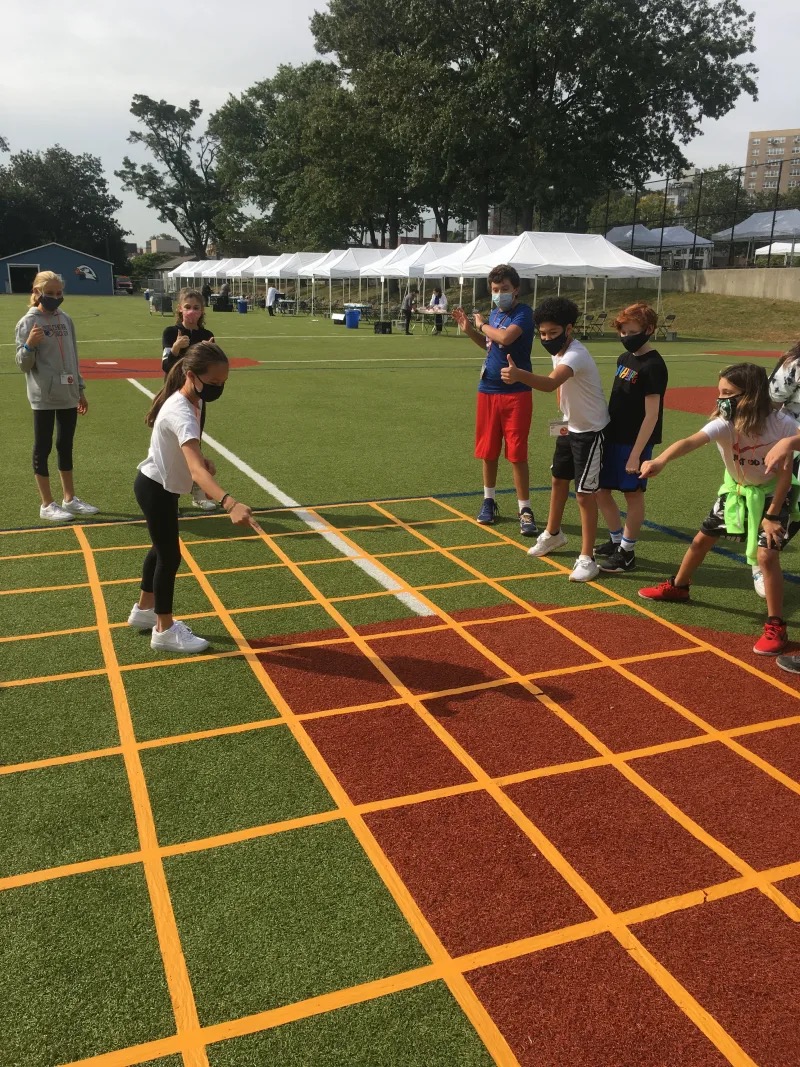
ECFS faculty and staff have guided their classes through the challenges of this year with incredible strength and perseverance, often setting aside their own needs to support those of their students. To help support faculty and staff, KC Cohen, Fieldston Upper and Middle Director of Health and Wellness, hosted weekly lunch meetings. During these meetings, Cohen and her team shared resources and educational tools for supporting students as well as themselves. Guided meditations, yoga, and mindfulness sessions were also offered throughout the year.
How can you support yourself and your family?
As we collectively navigate these unprecedented times, here are a few tips from the Fieldston Middle Counseling team for ways to support the mental, physical, and emotional well-being of yourself and your family.
Acknowledge your feelings.
In order to care for others, we have to first acknowledge the emotional toll this experience has taken on all of us. Everyone processes things differently, but it’s safe to say that we have each experienced moments of feeling okay and others of feeling scared, disappointed, angry, frustrated, anxious, or overwhelmed. With the tremendous stress of working from home and managing household and childcare responsibilities, it is common to be unaware of how you are feeling. It is important to slow down and check in with yourself about how you are doing emotionally. Taking the time to feel your feelings — no matter what they are — is important and necessary. Try your best to accept your feelings without any judgment.
Distinguish between productive and unproductive worries.
Spending time weighing pros and cons and problem-solving can be a productive and essential component of decision-making. However, ruminating about your decision once it’s made or about things that are not within your control can be distressing and generally unhelpful. Distinguishing between productive versus unproductive worries is a good way to curb the frequency and intensity of your worrying.
Practice self-compassion.
To practice self-compassion, it is helpful to think of giving yourself the same kindness and care you would offer a close relative or friend. Try not to hold yourself to impossible or unattainable standards. Give yourself a break when needed and refrain from blame and unnecessary judgment. We are all just trying to be the best parent, guardian, partner, or friend we can.
Practice self-care.
Self-care is any activity we deliberately do in order to take care of our own mental, emotional, and physical health. One of the most common myths about self-care is that it is synonymous with self-indulgence — and it is therefore often relegated to the bottom of our to-do lists. For parents and guardians to be the best versions of themselves — and for them to be able to care for their children most effectively — they need to make sure that their own needs are being met. Practicing self-care also provides a healthy model for your families. Here are some important areas of self-care to focus on:
- Get some sleep. The amount of sleep you get greatly impacts your mood. Make sure you and your family go to bed at a regular time each night, and make it a goal for everyone to get nine to twelve hours of sleep as often as possible.
- Keep your body moving. Your body releases mood-improving chemicals when you exercise. Look for ways to incorporate physical activity into your family’s daily schedule each day. Go for a walk together or while you call a friend to catch up. There are also many free or subscription online yoga and exercise classes to join if you prefer more high-intensity activities.
- Be mindful. Mindfulness is the practice of being aware of the world around you and focusing on what you are experiencing. Throughout your day, remind yourself to be fully present and focus on the now.
- Eat foods that nourish and comfort you. Food fuels your body’s health, including your brain’s. Be mindful about your family’s food choices and nutrition, but don’t be afraid to eat comforting foods during this time.
- Confront stress head-on. Stress can take a serious toll on your and your family’s mental health. To feel more empowered and less overwhelmed, make a list of things that bring you stress and come up with a plan for coping with each of them.
Focus on you.
Have you been wanting to learn how to do something new or return to an old hobby? Now is a great time to do that. Focusing on yourself is a productive way to look after your mental health. Praise yourself for getting out of your comfort zone and any small accomplishment that comes along the way.
Open up to someone.
Talking about your feelings is a great way to process them. Feelings can be confusing, and it’s important to get them out in healthy ways so they don’t stay bottled up and find their own ways of getting out. Talk to a family member or a trusted friend when you have a problem or something is bothering you. The ECFS Counseling team is available to both students and parents and guardians — please reach out at any time.
Experience gratitude.
Notice the things you are thankful for each day — both small and big — and regularly reflect on and feel grateful for each of these things. Consider writing a gratitude list to reflect on and remember the small things that you appreciate during this unprecedented time.
Help someone else.
Helping others has been shown to reduce stress and improve your mental health. It also just makes you feel good. This can be as simple as offering to help a family member with a chore or reaching out to a friend to ask how they’ve been.
Reflect and disconnect.
Put away your computer, phone, tablet, or TV, and take some time each day to rest, relax, and reflect — disconnected. Consider writing your thoughts in a journal; it may be nice to go back and read your reflections at a later time.
